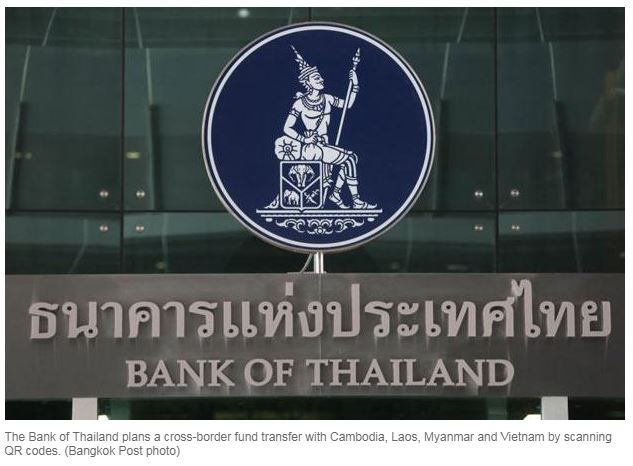Bank of Thailand pushes CLMV transfers
The Bank of Thailand has initiated a cross-border fund transfer with Cambodia, Laos, Myanmar and Vietnam (CLMV) by scanning QR codes in a move to facilitate deeper integration in the region.
The money transfer service will help lower fund transfer costs in the region, particularly CLMV migrant workers in Thailand who are now charged 10% of the money transfer amount for remittance service, said Finance Minister Apisak Tantivorawong after a meeting to connect the Thai capital market with others in the region.
The Phnom Penh Post recently reported the central banks of Thailand and Cambodia are working together to roll out the QR code payment system in 2019.
The Bank of Thailand also proposed the use of local currencies for trade settlement between Thailand and CLMV to reduce operators’ costs and risks from foreign currency conversion, said Mr Apisak.
Trade in the region now uses the US dollar for settlement and this adds payment costs for operators, given the currency swap.
The Bank of Thailand has struck a deal with Bank Negara Malaysia for direct local currency settlements between the baht and ringgit for a number of years. This deal marks the first bilateral currency exchange pact within the 10-nation Asean bloc.
Mr Apisak said it is necessary to narrow the gap between bid and offer prices of local currencies to facilitate direct local currency settlement for trades. The Bank of Thailand will take responsibility for the issue.
It is difficult to let the market try to narrow the gap as settlement volume is still minimal, so the central bank must make it happen, he said.
Direct settlement between the baht and yuan is possible if their spread is narrowed, said Mr Apisak.
He said a cross listing between the Stock Exchange of Thailand (SET) and CLMV bourses would help all related parties, but neighbouring countries are concerned their stock exchanges will be wiped out if they integrate with the SET.
The Thai stock exchange is more developed than its neighbours, enabling the former to help its peers to develop theirs, said Mr Apisak.
Cross-listing helps CLMV bourses because the SET has high trading liquidity and can assist them with back office operations, he said.
The Hong Kong Exchange recently expressed its intention to connect with the SET and the local market will become more attractive if it happens, said Mr Apisak.
In separate news, he said the Office of the Insurance Commission (OIC) floated the idea of allowing international reinsurance companies to set up their branches in Thailand to operate here without reinsuring outside the country.
Thai insurers always reinsure in Singapore to diversify their risk as local reinsurers do not have adequate capital to cover all the re-insurance premiums, said Mr Apisak.
Source: https://www.bangkokpost.com/business/finance/1550374/bank-of-thailand-pushes-clmv-transfers


 Thailand
Thailand




